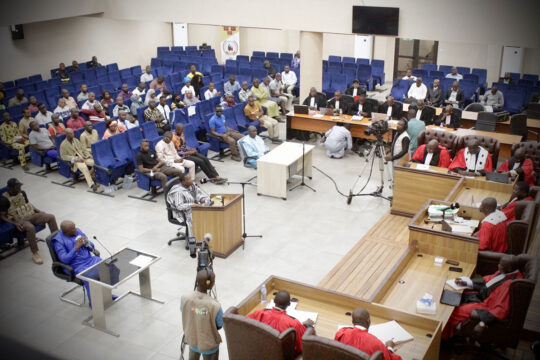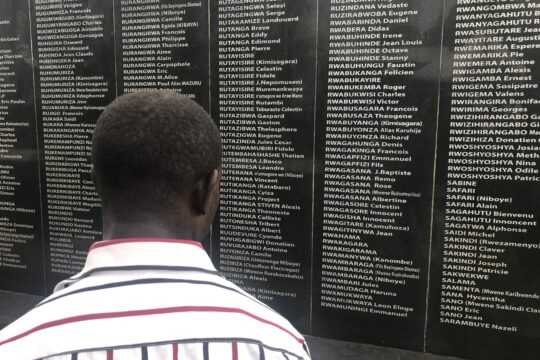After 33 years in the relentless pursuit of truth and accountability the family of anti-apartheid activist Nokuthula Simelane will finally see justice done. On 8 February 2016, the National Prosecuting Authority (NPA) announced that it will charge four former apartheid security policemen with her murder and kidnapping.
Although the South African Truth and Reconciliation Commission (TRC) recommended that more than 300 cases should be prosecuted, this is the first prosecution of apartheid-era perpetrators since the 2007 plea bargain agreement was struck with former police minister, Adriaan Vlok and four senior police officers.
Nokuthula Simelane was abducted, tortured and forcibly disappeared by members of the Security Branch of the former South African Police in 1983. She was a 23 year old university graduate and acted as a courier for Umkhonto we Sizwe, the armed wing of the African National Congress, moving between Swaziland and South Africa. Her remains have never been found. The family has been denied the right to bury their daughter with the dignity she deserves.
In 1996, a police docket was opened and in 2001 the Amnesty Committee of the Truth and Reconciliation Commission (TRC) granted some of the perpetrators amnesty for Nokuthula’s abduction, including certain police officers who the Committee found had lied about her brutal torture. None of the perpetrators applied for amnesty for her murder. Simelane family’s pleas for an inquest were denied and requests to institute criminal proceedings against the suspects who did not apply for amnesty were refused.
In the last ditch attempt, Thembi Nkadimeng, sister of Nokuthula filed an application before the the High Court seeking to compel the National Director of Public Prosecutions (NDPP) to make a decision in respect of Nokuthula’s disappearance. The application, which included supporting affidavits from former NDPP, Vusi Pikoli and a senior prosecutor, disclosed how the Simelane case, as well the other cases recommended by the TRC, were suppressed as a result of direct political interference.
ICTJ’s Howard Varney has been working on this application and representing Simelane’s family from the beginning. In the conversation with ICTJ’s Communication Director, Refik Hodzic, Varney describes the details of this fascinating struggle for justice and the implications of the High Court’s decision.
Like nothing before it, Nokuthula Simelane’s case has revealed the difficult truth about pervasive impunity in the country which has long been seen as something of a poster child for transitional justice, with the celebrated “truth for amnesty” mechanism as its center piece.
“Given that innovative approach, South Africans and victims in particular, expected some consequences to follow [for those who did not apply for amnesty], investigations and, where appropriate, prosecutions to proceed. But, less than a handful cases were taken forward from around 400 cases that the TRC handed over,” says Varney.
Victims groups and human rights activists long speculated that there might have been political interference and pressure on the public prosecutors to abandon investigations into apartheid-era crimes. The information Varney gathered in preparing the High Court petition confirmed this was in fact the case.
“I approached the former director of NPA, Vusi Pikoli, as well as the senior prosecutor who was in charge of the unit that handled TRC cases and they confirmed to me in sworn affidavits that these investigations were closed down, that they were unable to take them further because of the political obstructionism. Pikoli described how he would be taken to various meetings, sometimes at night, at the home of cabinet ministers and simply told that these cases could not proceed as they would be opening up a can of worms. The message was that if prosecutors went against the former police officers, it would open the door to investigations into the ruling party members, possibly even sitting government ministers,” explains Varney.
The evidence of political interference in Simelane’s and other TRC cases has ignited a public debate about the government’s failure to implement TRC’s recommendation. After the High Court’s decision, the TRC’s chairman, Archbishop Desmond Tutu was clear about the TRC’s “unfinished business”.
“The tardy and limited payments of reparations to victims of human rights violations eroded the very dignity that the commission sought to build. The fact that the government did not prosecute those who were refused amnesty or failed to apply for amnesty, undermined those who did. The proposal of a once-off wealth tax as a vehicle for those who had benefited from the past to contribute to the future was stillborn.
I maintain that healing is a process. How we deal with the truth after its telling defines the success of the process. And this is where South Africa has fallen tragically short. By choosing not to follow through on the commission’s recommendations, government not only compromised the commission’s contribution to the process, but the very process itself,” says Tutu in his statement.
It remains to be seen what comes out of the public debate about the eroding legacy of the TRC in South Africa, if indeed the society has the strength to see the process through twenty years after the closure of its celebrated Truth and Reconciliation Commission. Whatever happens, one thing is certain: on February 26, four members of the Security Branch of the SA police - Msebenzi Timothy Vastrap Radebe, Anton Pretorius, Frederick Barnard Mong and Willem Helm Johanes Coetze – will face justice for the murder of Nokuthula Simelane. After 33 years of struggle, Simelane’s mother, sister and two brothers will see her killers in the dock. Howard Varney will be by the family’s side.
“This is just one milestone, there is a whole journey ahead. We must ensure that the prosecution is supported, that it is a coherent prosecution and that justice is done in due course. We will see to that.”
Cet article a été publié par Justice Truth Dignity




